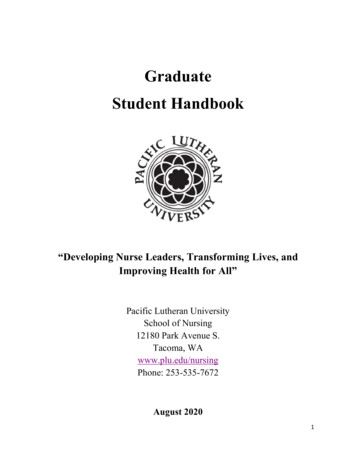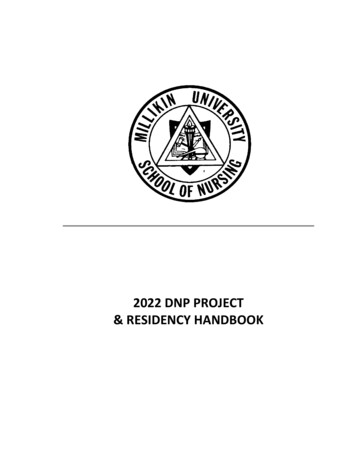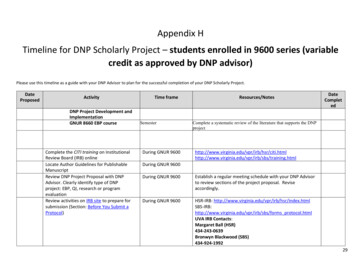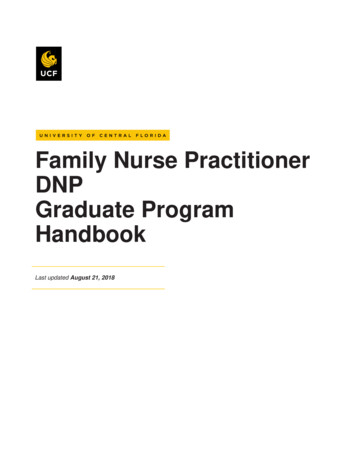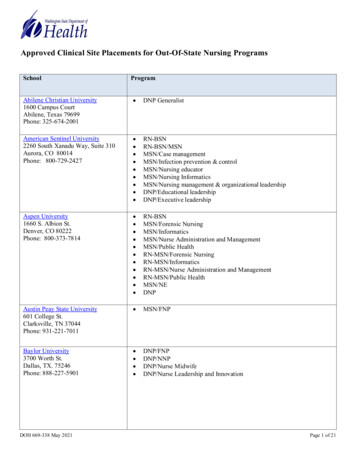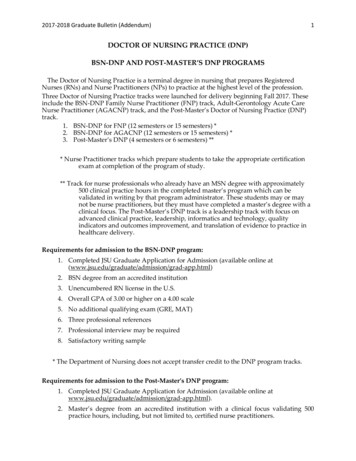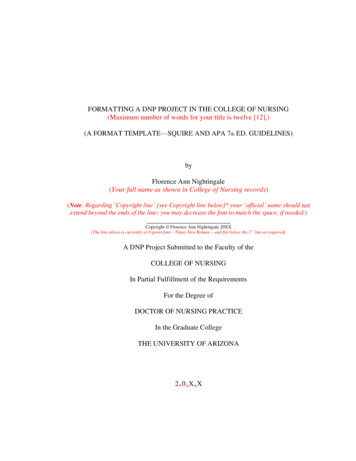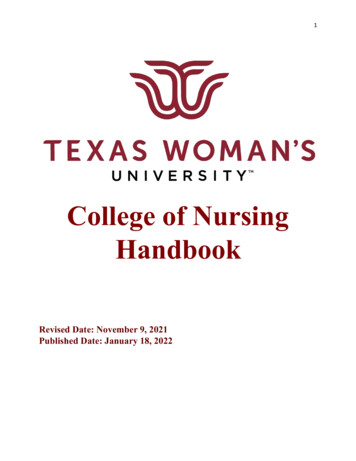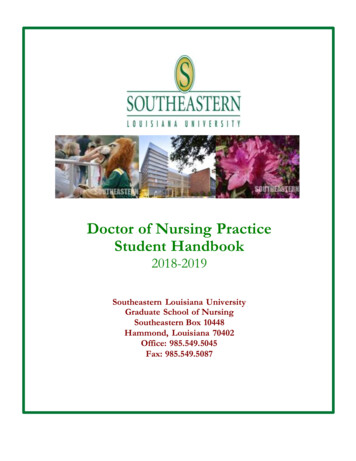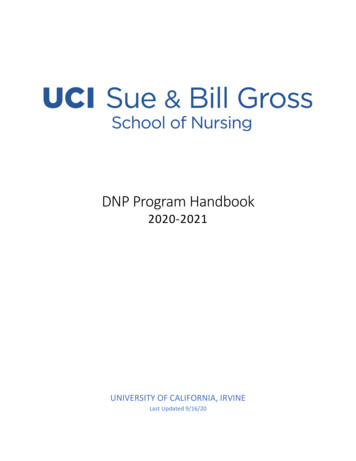
Transcription
DNP Program Handbook2020-2021UNIVERSITY OF CALIFORNIA, IRVINELast Updated 9/16/20
TABLE OF CONTENTSFaculty Directory.- 3 Nursing Student Affairs .- 3 Frequently Asked Questions .- 3 Introduction .- 5 Purpose of the Student Handbook . - 5 Program Description . - 5 Mission of the School of Nursing . - 5 Vision of the School of Nursing . - 5 Doctor of Nursing Practice (DNP) Background . - 6 Doctor of Nursing Practice (DNP) Program Goals . - 7 DNP Academic Requirements and Steps to Successful Program Completion .- 7 DNP - FNP Curriculum . - 7 DNP (Post-Master’s) Curriculum . - 8 Required Courses . - 8 Waiver or Transfer of Units or Courses . - 11 The Faculty Advisor . - 11 Evaluation of Student Progress . - 11 Progression through the DNP Program . - 11 DNP Scholarly Project . - 11 Scholarly Project Completion. - 12 DNP Program Completion Timeline . - 12 Advancement to Candidacy . - 13 Maximum Time Frame (Pace) . - 13 Lapse of Status Policy. - 13 Leave of Absence (LOA) for UCI Graduate Students . - 14 Readmission Policy. - 14 Withdrawal Policy . - 14 Disqualification vs. Dismissal . - 15 Academic Conditional Status and Academic Disqualification. - 15 School and University Policies . - 16 Academic Calendar . - 16 Grading Scale for Graduate Nursing Courses. - 16 -
Grievance Process . - 16 Residency Requirements . - 16 Academic Honesty . - 16 Attendance Policy . - 17 Faculty Committees, School of Nursing: Student Participation . - 17 Enrollment . - 17 Professional Conduct . - 17 Unprofessional Conduct. - 18 Process for Addressing Unprofessional Conduct . - 18 Consequences of Unprofessional Conduct . - 18 Resources for Graduate Students . - 19 Graduate Resource Center. - 19 Division of Career Pathways . - 19 Financial Aid . - 19 Library Resources . - 19 Lactation Rooms at the UCI Campus. - 21 Campus Resources . - 22 Practicalities . - 23 Change of Address, Phone or Name . - 23 UCInetID . - 23 Identification Cards . - 23 Email. - 23 Registration . - 23 Tuition and Fees . - 24 Reimbursement for Withdrawal/Dropping/Circumstances . - 24 Course Refund Policy . - 24 Appendix A: Handbook Acknowledgment and Consent . - 25 -
FACULTY DIRECTORYPlease see the following link for faculty: https://nursing.uci.edu/faculty/NURSING STUDENT AFFAIRSNursing Science Student Affairs is a primary resource for student information, advising, and assistance. AcademicCounselors advise current and prospective students on admission and academics in person, on the phone, or by email.Academic Counselors are aware of all University policies and School requirements. Academic Counselors review andprovide expert counseling on most of your paperwork during your program of study and can assist with situations suchas leave of absences or waivers of coursework. Academic Counselors are available to discuss any issue related to yourmatriculation as a graduate student at UC Irvine. They refer students to appropriate campus resources at UCI to supportstudent success and wellbeing, including assistance with learning skills, mental health support, financial aid, studentdisability issues, or other resources.LOCATION:Student Affairs is located in 252 Berk Hall. Berk Hall is Building Number 802 on the campus map.OFFICE HOURS:Monday through Friday: 8:00 am to 12:00 and 1:00pm to 5:00pmClosed from 12:00 to 1:00 pm for lunchWEBSITE:https://nursing.uci.edu/students/Find up to date forms, curriculum charts, resources, and other student services on our websiteEMAIL:Graduate Programs Email Address:gnsao@uci.eduCOUNSELING STAFF CONTACT INFORMATION:Megan Enciso, Director of Student AffairsChanelle Guillaume, DNP & Ph.D. Academic CounselorKim Cattarusa-Bernard, B.S. & MEPN Academic CounselorCely Dean, Administrative @uci.eduadean@uci.eduFREQUENTLY ASKED QUESTIONSWhere can I purchase course books?Required and recommended texts for courses in the DNP program may be purchased at The Hill (UCI Bookstore) and/orthrough online vendors. Both required and recommended texts are course-specific and can be found in individualcourse syllabi.Where can I park on campus?DNP students will receive complimentary parking for all required SON on-campus course activities and will be notifiedabout the process for obtaining their permit. For students who visit campus at additional times, short-term, one-daypermits can be purchased at parking kiosks located throughout campus or at the Transportation Services Office.-3-
Where will classes be held?Most course learning activities will be online. During quarters in which DNP students are required to attend on-campussessions, room assignments will be determined one week prior to the start of each quarter and students will be notifiedby email.Do I have access to UCI libraries?Yes. All students have access to the libraries at UCI Medical Center and on campus.DNP learners will also have access to the UCI library’s online resources, journals, and databases.-4-
INTRODUCTIONPurpose of the Student HandbookWelcome to the University of California, Irvine: Sue & Bill Gross School of Nursing, Doctor of Nursing Practice (DNP)Program.This handbook will provide you with essential information about the DNP program. We urge you to carefully review thisdocument and others provided to you by the University to strengthen your understanding of our philosophy, mission,policies, and procedures. This handbook is prepared in conjunction with the policies expressed in the UC Irvine (UCI)General Catalogue and the Graduate Policies and Procedures, and both serve as excellent resources for students.Program DescriptionThe Doctor of Nursing Practice degree is the new scholarly standard for advanced practice nursing and for nursesseeking a practice focused doctorate. Our future DNP graduates will be accomplished practitioners of translationalresearch for evidence-based practice, advocates of innovative policy, and leaders of interdisciplinary health care teams.Mission of the School of NursingOur mission is to advance the science of health and healthcare through innovative research, teaching, and clinicalpractice, and educate nursing professionals who inspire optimal health and well-being in individuals, families andcommunities.Vision of the School of NursingOur vision is to transform the nursing profession by preparing pioneers in research, education, and practice to buildinnovative, interprofessional models of compassionate community-based healthcare.Philosophy of the School of NursingThe philosophy of the Sue & Bill Gross School of Nursing is aligned with the academic goals expressed by UC Irvine andemanates from the mission and goals of both UC Irvine and the University of California; our philosophy applies to bothgraduate and undergraduate programs.Nursing is interdisciplinary and collaborative in its art and its science. Together with other health professionals, theprofessional nurse addresses health care needs of individuals, families, and groups from diverse backgrounds. Healthcare needs range across the health-illness continuum from health promotion and wellness to intervention, treatment,rehabilitation, restoration, and palliation in response to illness.Professional nursing practice can occur in any environment and includes research, clinical practice, education, andleadership roles. Nursing practice is guided by a set of ethical principles that include a commitment to service andquality health care for all people regardless of their culture, race, gender, or social status. Each person with whomnurses interact possesses a unique set of biological, behavioral, socio-cultural, and spiritual characteristics. It is theresponsibility of the professional nurse to understand and respect these characteristics and their role in the well-beingof the individual. It is the right and responsibility of the individual, family, or group to make autonomous health caredecisions and to collaborate with nurses and other health care professionals in their care.-5-
Nursing research and scholarship provides the evidence for nursing practice and is both basic and applied. Professionalnurses evaluate the evidence when considering care alternatives. They participate in research to advance scholarlynursing practice that is founded on scientific principles.Nursing students are unique individuals with diverse backgrounds and life experiences that enrich the educationalenvironment for all students. Nursing students require substantive backgrounds in the theory and practice of nursing aswell as in related disciplines including the biological, social, behavioral, medical, pharmaceutical, and biomedicalsciences. They also require guidance to achieve increasingly complex levels of socialization, critical thinking, written andoral expression, and research skill based on their educational level. Nursing students have the responsibility to activelyparticipate in their learning. The University provides multiple support systems which students have the responsibility toaccess when needed. Faculty have the responsibility of structuring the teaching and learning environment to facilitatestudent learning taking into consideration individual learning styles and personal professional goals.Doctor of Nursing Practice (DNP) BackgroundThe DNP degree is a professional practice‐focused doctorate designed to develop competencies for advanced clinicaland leadership roles in nursing and healthcare. This program will increase opportunities to prepare nurses to meet thedemands of an increasingly complex and changing healthcare landscape. The need for a practice‐focused doctoralprogram was highlighted in 2004 when the American Association of Colleges of Nursing (AACN) recommended theestablishment of the DNP as the professional, practice‐focused doctoral degree in nursing. The AACN recommended thatthe DNP be the required credential for nurses seeking Advanced Practice Registered Nursing (APRN) certification,including the roles of Clinical Nurse Specialist, Nurse Practitioner, Certified Nurse Midwife and Certified Registered NurseAnesthetist. Additionally, other nurses in the United States seeking a practice‐focused doctoral degree in nursing, ratherthan a research‐focused doctoral degree, are selecting the DNP degree as a terminal degree.DNP-FNPThe Doctor of Nursing Practice degree with a Family Nurse Practitioner concentration is the first and only program of itskind currently offered by a University of California campus. Our program is designed for BS and MS prepared nurses toachieve a doctoral degree with a FNP concentration in a compact and comprehensive three-year program. As rigorous asit is rewarding, the DNP – FNP program prepares graduates for autonomous family practice and interprofessionalleadership at the highest level.The DNP – FNP program, for both BS and MS applicants, is a three-year hybrid commitment. This means students willparticipate online in asynchronous and synchronous sessions with the faculty and cohort. To respect the career status ofeach one of our students, the program requires one highly focused on-campus session during most quarters along withmandatory attendance to the Prologue, Intersession, and Epilogue for the didactic portion of the program. Additionally,for students in the DNP-FNP track, there are two required advanced physical assessment in-person competency sessionsin the fall quarter of Year 2.The DNP – FNP curriculum provides education in organizational and systems leadership, research and analyticalmethods, health care policy, interprofessional practice, clinical prevention, and population health to prepare ourgraduates for a multi-faceted and rounded approach to health care improvement. They will apply their knowledge in theDNP Scholarly Project – a capstone project of original work that establishes the student as a UCI Sue & Bill Gross Schoolof Nursing clinical scholar. Practice expertise in patient care is incorporated throughout the program. Students willcomplete a total of 1,020 hours of clinical and professional practice.DNP (Post-Master’s)The Doctor of Nursing Practice program, for post-master’s applicants, is a two-year online and hybrid commitment. Thismeans students will participate online in asynchronous and synchronous sessions with the professors and cohort.-6-
Recognizing that our students are working professionals, our programs only requires our students to attend one highlyfocused on-campus session each quarter, along with mandatory attendance of the Prologue, Intersession, and Epilogueportions of the program.The DNP program curriculum provides education in organizational and systems leadership for quality improvement,research and analytical methods for evidence-based practice, education, policy, and population health. Students willdevelop their abilities throughout the program and through 510 hours of clinical practicum. They will apply theirknowledge in the DNP Scholarly Project – a capstone project of original work that establishes the student as a UCI Sue &Bill Gross School of Nursing clinical scholar.Doctor of Nursing Practice (DNP) Program GoalsLearning Outcomes of the DNP Program: Upon completion of the DNP Program curriculum, and as consistent withAACN expectations and standards, the DNP graduate will be able to:1. Demonstrate advanced levels of clinical judgment, systems thinking and accountability in designing, delivering, andevaluating evidence‐based care to improve patient outcomes.2. Integrate nursing science, science‐based theory, and systems knowledge into the development and evaluation of newpractice approaches to care.3. Employ advanced communication skills and processes to lead quality improvement and safety initiatives.4. Apply analytic methods to the critical appraisal of literature and other evidence to develop and support best practice.5. Disseminate data from evidence‐based practice and research to support improvements in health outcomes.6. Convene and lead interprofessional, collaborative stakeholder teams to create change and advance positive healthoutcomes.7. Generate, evaluate, and articulate innovative solutions to complex care issues.8. Analyze the impact of local, national, and global health policy on determinants of care decisions.9. Support cost and resource efficiency, quality and accessibility of health care for diverse client groups.10. Advocate for nursing and socially‐ and ethically‐relevant policy in health care design and delivery.11. Support and effectively lead quality improvement initiatives that enhance safe, high quality, and evidence‐drivencare.12. Effectively synthesize data from research, practice evidence, and other credible sources to drive carerecommendations and policy.DNP ACADEMIC REQUIREMENTS AND STEPS TO SUCCESSFUL PROGRAM COMPLETIONDNP - FNP CurriculumThe DNP Program requires a combination of didactic and clinical content with additional doctoral practicum units.The DNP- FNP track requires eleven (11) quarters for completion and may be completed in less than 3 calendaryears. DNP - FNP students are required to complete 98 quarter units of formal coursework, consisting of DNP corecourses, APRN (NP Role) courses, and DNP APRN Practicum courses. Education focus courses are available aselectives. The curricular unit load and duration of the track is consistent with other established DNP programs.-7-
DNP (Post-Master’s) CurriculumThe DNP Program requires a combination of didactic and clinical content with additional doctoral practicum units.The DNP Post-Master’s track requires seven (7) quarters for completion and can be completed in less than 2calendar years. DNP (Post-Master’s) students are required to complete 53 quarter units of formal coursework,consisting of DNP core courses, education focused course, and DNP practicum courses. Education focus courses arerequired in this curriculum. The curricular unit load and duration of the track is consistent with other establishedDNP programsRequired CoursesTo see course descriptions please access the General Catalogue.See the curriculum plan for your specific track:DNP FNP-8-
-9-
DNP (Post Master’s)- 10 -
Waiver or Transfer of Units or CoursesCourses taken toward a graduate degree at another institution cannot be transferred for credit toward a DNP or PhD atUCI. However, a course requirement may be waived if a similar course was taken at another institution. The GeneralPetition should be used for all requests for waivers of coursework. However, per University policy, all DNP studentsmust graduate with the specified number of units required in their doctoral degree program, which is 98 units for DNP –FNP or 53 units for DNP (Post-Master’s). A course waiver may be obtained for a maximum of 2 DNP courses.To obtain a course waiver for potential course equivalencies, students must provide a full description of the course, thetranscript and syllabus for the course. Additional course documents may be requested by the faculty reviewing thewaiver. If the course is determined to be equivalent by the faculty reviewing the course, it will be submitted to theGraduate Division with the General Petition form for review and approval. However, you must take another course inour DNP program in order to earn the requisite number of units for the program. One of the two education-focusedelectives will fulfill that requirement for DNP – FNP students; for DNP (Post-Master’s) students, additional courses maybe taken from the DNP-FNP curriculum. Additionally, please be advised that course waivers do not provide a tuition feereduction.The Faculty AdvisorAll DNP students are assigned an academic faculty advisor in the School of Nursing. Graduate students are assignedupon entry to the graduate program. Faculty advisors are specifically focused on the professional development ofstudents. They are also familiar with strategies for program success and can direct students in seeking resources. It isimportant to meet with your faculty advisor regularly (each quarter) and keep them apprised of your progress inmeeting program objectives. Please make yourself familiar with the UCI Graduate Division website, which hasinformation on all graduate policies.Evaluation of Student ProgressDNP students will be evaluated periodically for progress towards the degree. The DNP Faculty Advisor will review thestudents’ Portfolios to determine whether they are progressing adequately in their studies. If students are not makingsatisfactory progress they will be counseled and may be placed on academic conditional status.PROGRESSION THROUGH THE DNP PROGRAMDNP Scholarly ProjectAs a professional practice‐focused degree the Doctor of Nursing Practice (DNP) differs from a PhD in Nursing in that DNPstudents will complete a Scholarly Project instead of a research‐based dissertation.Students will develop their abilities throughout the program and apply their knowledge in the DNP Scholarly Project – acapstone project of original work that establishes the student as a UCI Sue & Bill Gross School of Nursing clinical scholar.Students are encouraged to focus their scholarly project in the following areas:1.2.3.4.Quality ImprovementClinical or Practice-based inquiryHealthcare delivery innovationHealthcare policy- 11 -
Based on their area of scholarly interest for the project, each student will either be assigned a DNP Scholarly ProjectChair who is a faculty member in the SON, or the student will request a SON faculty member to serve as their DNPScholarly Project Chair. Ideally, the DNP student’s interest will align with the SONs faculty’s scholarly interest. Thatfaculty member will mentor and guide the student in their Scholarly Project through completion. One additional DNPScholarly Project Team Member will be selected or assigned to the DNP student and this individual must be doctorallyprepared and have a University appointment. Students may select/request additional DNP Scholarly Project Teamsupport by identifying professionals with content expertise in the area being studied. That Team member may be acommunity member identified by the student, or an additional faculty member in the SON.Students are expected to progress through the curriculum as designed. Many courses provide foundational content forsubsequent courses, so completing courses in sequence is required. Courses are taught once per year. Students who donot complete courses sequentially may significantly delay their time for program completion.Successful progression through the DNP APRN Practicum or the DNP Practicum course series and DNP Scholarly Projectseries courses is mandatory prior to moving forward to the next course in sequence. Evidence of student performanceand eligibility to move forward to the next sequential course will be determined by evaluation of the student’s log ofpracticum experiences, written evaluation from both faculty and the clinical site mentor (as appropriate), and ongoingcommunication between the student, clinical site mentor and program faculty.In preparation for developing this DNP Scholarly Project students will complete a DNP Project Proposal and present thisto their DNP Team Chair, Team Member, faculty and cohort. Once approved the student will begin work on their DNPProject. The DNP Project will require students to demonstrate a synthesis of evidence-based practice in a practice areaspecific to their specialty or interest. The student will complete a formal presentation of completed work to the DNPScholarly Project Team. Development of a formal manuscript suitable for publication will also be supported but notrequired.The DNP Project requires a synthesis of leadership, policy, quality, management, and practice learning experiences. Eachstudent will collaborate with an agency, ideally their current clinical setting to address a real-world problem or healthissue. Strong professional writing and public speaking skills are expected as part of the DNP Project. Institutional ReviewBoard (IRB) approval, from both UCI and the proposed clinical site of the DNP Project, if indicated by IRB criteria, will berequired for the respective students in accordance with policy and requirements at each setting. Copies of all IRBapprovals associated with the DNP Project shall be provided to and maintained securely on file with UCI DNP Degreeprogram materials.Scholarly Project CompletionDNP - FNP students who have advanced to candidacy must complete their DNP Scholarly Project and all courseworkwithin sixteen quarters/terms of study from initial enrollment.DNP (Post-Master’s) students who have advanced to candidacy must complete their DNP Scholarly Project and allcoursework within ten quarters/terms of study from initial enrollment.Students must meet with their DNP Scholarly Project Team Chair at least once per quarter during this time. It isrecommended that students communicate their progress to their DNP Scholarly Project Team Members at minimum ona quarterly basis and confer with individual team members about specific aspects of their DNP Scholarly Project orwriting as needed. Students are expected to complete all degree requirements within the timeline specified above.DNP Program Completion Timeline- 12 -
The normative time to complete the requirements for the DNP - FNP is 11 quarters and for the DNP (Post-Master’s)degree it is 7 quarters. Students should meet with their graduate advisors at least once a quarter/term. Satisfactoryacademic progress is marked by timely and successful completion of all courses, with grades of “B” or better in allrequired courses, and cumulative GPA of 3.0 or above in all
Doctor of Nursing Practice (DNP) Program Goals Learning Outcomes of the DNP Program: Upon completion of the DNP Program curriculum, and as consistent with AACN expectations and standards, the DNP graduate will be able to: 1. Demonstrate advanced levels of clinical judgment, systems thinking and accountability in designing, delivering, and
